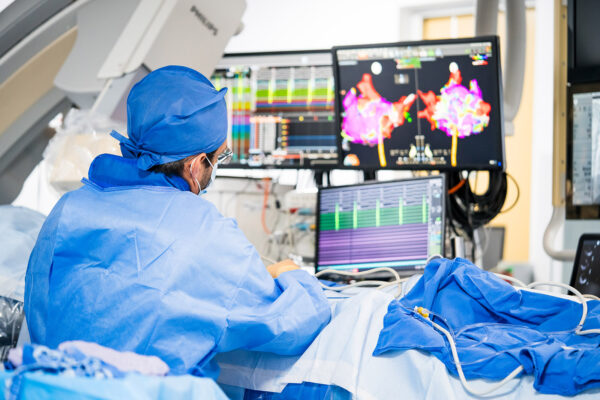
Cardiac Ablation at Hospital CMQ: Advanced Treatment for Arrhythmias in Puerto Vallarta and Riviera Nayarit
Cardiac ablation is a minimally invasive procedure that helps eliminate and correct arrhythmias and restore the heart’s normal rhythm. In Mexico, it is estimated that more than 1.5 million Mexicans live with some type of heart problem, making it the leading cause of death in the country. However, although many arrhythmias may be mild, some can increase the risk of heart failure, stroke, or serious complications if not treated in time.
At Hospital CMQ, we provide cardiac ablation treatment with state-of-the-art technology and a team of highly trained interventional cardiologists and electrophysiologists. Therefore, if you suffer from irregular palpitations, discontinuous heartbeats, or have been diagnosed with an arrhythmia, read on and find out if cardiac ablation is the best option for you.
What is a Heart Ablation?
Cardiac ablation is a minimally invasive medical procedure used to treat various types of arrhythmias or heart rhythm disorders. This procedure involves the removal of small areas of heart tissue that generate abnormal electrical signals, resulting in irregular heartbeats. Doctors insert catheters through the blood vessels into the heart and apply thermal energy to correct its faulty activity.
This minimally invasive procedure is indicated for patients with arrhythmias or tachycardia, especially when medications have not been effective or when symptoms begin to severely impact quality of life. In addition, ablation can significantly improve heart rhythm, reduce the need for medications, and decrease the risk of complications associated with arrhythmias. It also achieves lasting control of the problem, allowing our patients to lead healthier, symptom-free lives.

Cardiac Ablation Specialists at Hospital CMQ: Meet Our Cardiology and Electrophysiology Experts
At Hospital CMQ, we have a team of highly trained specialists in cardiology and electrophysiology, dedicated to the diagnosis and treatment of arrhythmias through the use of modern procedures such as cardiac ablation. With a combination of experience, cutting-edge technology, and a personal approach, our team specializes in providing effective solutions to restore cardiac rhythm and improve the quality of life of our patients.
At Hospital CMQ, your heart is in the best hands!
Schedule your appointment today.
Cardiac Ablation Procedure
As mentioned above, heart ablation is a minimally invasive procedure to treat arrhythmias and restore normal heart rhythm. At Hospital CMQ, this procedure is perform in our modern Cath Lab, equipped with the most advanced technology that guarantees safety in every medical intervention.
Step-By-Step: What You Need to Know About This Procedure
To begin this procedure, our specialists administer local anesthesia and, in some cases, sedation for greater comfort. They then insert catheters through a vein and guide them to the heart with the help of real-time imaging. Once the catheters are in position, they perform an electrophysiological study to register the heart’s electrical signals and identify the exact site responsible for the arrhythmia. After locating the affected area, they apply radiofrequency or cryoablation energy to neutralize the tissue and correct the heart rhythm disturbance.
Finally, the catheters are removed and the patient is transferred to our recovery room, where he/she will remain under observation for a few hours before medical discharge. This procedure is fast, safe, and effective and allows many patients to reduce their dependence on medication and significantly improve their quality of life. In addition, as it is a minimally invasive procedure, recovery is usually fast and you can return to your daily activities in a few days. Recovery after cardiac ablation is quick and most patients can resume their routine activities within a few days. According to the Mayo Clinic, the procedure usually lasts between 3 and 6 hours, depending on the complexity of the arrhythmia and the type of ablation to be performed.
The Main Types of Ablation
There are different ablation techniques, depending on the type of arrhythmia and symptom characteristics. Some of the most common are:
- Radiofrequency ablation: It is the most common technique and uses heat energy to remove the tissue causing the arrhythmia. Through a catheter, a radiofrequency current is applied that generates heat and destroys the cells responsible for the abnormal rhythm, allowing the heart to recover its normal function.
- Cryoablation: Instead of heat, this technique uses extreme cold to freeze abnormal tissue and defective electrical signals. It is especially useful in certain types of arrhythmias, such as atrial fibrillation and some supraventricular tachycardia.
- Other techniques: In some cases, combined approaches or more advanced techniques may be used, such as laser ablation, which uses high-intensity light, or chemical ablation, in which specific substances are injected to modify the electrical activity of the heart. These options are used in more complex cases or when other techniques have not been effective.
Benefits and Risks: Is Cardiac Ablation the Best Option for You?
Cardiac ablation is an effective treatment for various arrhythmias, especially when medications have failed to control the problem. Among its main benefits is its ability to restore a normal heart rhythm, reducing symptoms such as palpitations, fatigue, and shortness of breath. In addition, in many cases, it reduces or eliminates the need for medication, improving the patient’s quality of life.
However, like any medical intervention, ablation carries certain risks. Although rare, these can include infection at the insertion site of the catheter, damage to blood vessels or cardiac tissue, and the possibility of developing new arrhythmias. Therefore, the decision to undergo this procedure should be made in conjunction with a specialist in cardiology or electrophysiology, who will evaluate your medical history, the severity of the arrhythmia, and treatment alternatives. At Hospital CMQ our experts will provide you with a personalized assessment to determine if cardiac ablation is the best option for you. Make your appointment today!
Life Expectancy After Cardiac Ablation: Care and Recommendations From Our Experts
For many patients, cardiac ablation significantly improves the quality of life and reduces the risk of stroke, heart failure, and other complications. But an important question remains: How does cardiac ablation affect life expectancy. Several studies suggest that successful cardiac ablation can extend life expectancy. Particularly for patients with atrial fibrillation or other persistent arrhythmias. The benefits include a reduced risk of stroke, improved heart function, and a lower mortality risk. However, while ablation does not guarantee a longer life on its own, combining it with a heart-healthy lifestyle maximizes the benefits and improves overall well-being.
Post-Ablation Care: Key Steps for Long-Term Heart Health
Following a cardiac ablation, proper care and lifestyle adjustments play a crucial role in maintaining a healthy heart. Here are the top recommendations from our experts at Hospital CMQ:
- Follow Your Doctor’s Recommendations: Take prescribed medications as directed, especially blood thinners if advised. Attend follow-up appointments to monitor heart function and detect any recurrence of arrhythmias.
- Maintain a Heart-Healthy Diet: Eat a balanced diet rich in fruits, vegetables, whole grains, and lean proteins.
- Stay Active but Avoid Overexertion: Engage in moderate physical activity, such as walking or swimming, for at least 30 minutes most days.
- Manage Stress and Prioritize Sleep: Practice stress-reducing techniques such as meditation, deep breathing, or yoga.
- Monitor for Symptoms and Seek Medical Attention If Needed: Watch for symptoms such as palpitations, dizziness, shortness of breath, or chest discomfort.
Cardiac ablation is a life-changing procedure that can enhance longevity and quality of life for many patients. By following expert recommendations on heart care, you can maximize the benefits of the procedure and enjoy a healthier, more active life. If you have questions about cardiac ablation or heart health, schedule a consultation with us today.
Frequently Asked Questions about Cardiac Ablation
Cardiac ablation is a minimally invasive procedure to treat abnormal heart rhythms by destroying small areas of heart tissue.
Is recommended for individuals with persistent or severe arrhythmias who do not respond well to medications or other treatments.
While it can significantly reduce or eliminate arrhythmias, some patients may experience a recurrence over time.
Most patients go home within 24 hours after the procedure. Recovery typically takes a few days to a week.
Possible risks include minor bleeding or bruising at the catheter site, temporary heart rhythm disturbances, blood clots, stroke, or heart damage.





